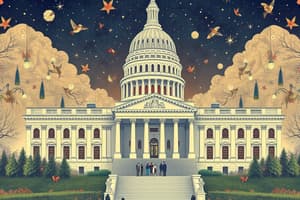Podcast
Questions and Answers
What does citizenship confer to individuals?
What does citizenship confer to individuals?
- Only the right to vote
- A permanent residence in a country
- Access to economic resources
- Legal status with rights and responsibilities (correct)
Which of the following is not a responsibility of citizens?
Which of the following is not a responsibility of citizens?
- Serve on juries when summoned
- Vote in foreign elections (correct)
- Obey laws and regulations
- Participate in civic duties
What best describes a republic?
What best describes a republic?
- An authoritarian state
- Rule by a monarchy
- Power held by an elite group
- A form of democracy considering the country a 'public matter' (correct)
What is the primary purpose of civic education?
What is the primary purpose of civic education?
Which political ideology emphasizes individual freedoms and equality?
Which political ideology emphasizes individual freedoms and equality?
What is federalism?
What is federalism?
Which concept focuses on the individual's engagement with community and political matters?
Which concept focuses on the individual's engagement with community and political matters?
What does the Constitution primarily establish?
What does the Constitution primarily establish?
Flashcards are hidden until you start studying
Study Notes
Definition of Civics
- Study of the rights and duties of citizenship.
- Focus on political institutions and the functioning of government.
Key Concepts in Civics
-
Citizenship
- Legal status granted to individuals, conferring rights and responsibilities.
- Can be acquired by birth, descent, or naturalization.
-
Rights of Citizens
- Civil Rights: Guarantees personal freedoms (e.g., freedom of speech, religion).
- Political Rights: Rights that allow participation in politics (e.g., voting).
- Economic Rights: Rights related to the economy (e.g., property ownership).
-
Responsibilities of Citizens
- Obey laws and regulations.
- Serve on juries when summoned.
- Participate in civic duties like voting and community service.
-
Government Structures
- Branches of government: Legislative, Executive, and Judicial.
- Federalism: Division of power between national and state governments.
-
Political Systems
- Democracy: Rule by the people through elected representatives.
- Republic: A form of democracy where the country is considered a "public matter."
- Authoritarianism: Concentration of power in a leader or an elite not responsible to the public.
Civic Engagement
- Importance of participating in civic life, including voting and activism.
- Encouragement of informed decision-making and critical thinking about political issues.
The Role of the Constitution
- Framework for government and protection of citizen rights.
- Establishes the rule of law and limits governmental powers.
Political Ideologies
- Liberalism: Emphasis on individual freedoms and equality.
- Conservatism: Focus on tradition, order, and maintaining established institutions.
- Progressivism: Advocacy for social reform, change, and addressing inequalities.
Civic Education
- Aim to prepare individuals to be informed, engaged citizens.
- Covers knowledge of government, understanding of rights and responsibilities, and skills for civic participation.
Global Citizenship
- Understanding rights and responsibilities on an international level.
- Emphasizes awareness of global issues and the interconnectedness of societies.
Definition of Civics
- Study of the rights and duties of citizenship
- Focuses on political institutions and the functioning of government
Citizenship
- Legal status granted to individuals, conferring rights and responsibilities
- Can be acquired by birth, descent, or naturalization
Rights of Citizens
- Civil Rights: Guarantees personal freedoms
- Examples: Freedom of speech, religion
- Political Rights: Rights that allow participation in politics
- Example: Voting
- Economic Rights: Rights related to the economy
- Example: Property ownership
Responsibilities of Citizens
- Obey laws and regulations
- Serve on juries when summoned
- Participate in civic duties like voting and community service
Government Structures
- Branches of government: Legislative, Executive, and Judicial
- Federalism: Division of power between national and state governments
Political Systems
- Democracy: Rule by the people through elected representatives
- Republic: A form of democracy where the country is considered a "public matter."
- Authoritarianism: Concentration of power in a leader or an elite not responsible to the public
Civic Engagement
- Importance of participating in civic life, including voting and activism
- Encouragement of informed decision-making and critical thinking about political issues
The Role of the Constitution
- Framework for government and protection of citizen rights
- Establishes the rule of law and limits governmental powers
Political Ideologies
- Liberalism: Emphasis on individual freedoms and equality
- Conservatism: Focus on tradition, order, and maintaining established institutions
- Progressivism: Advocacy for social reform, change, and addressing inequalities
Civic Education
- Aim to prepare individuals to be informed, engaged citizens
- Covers knowledge of government, understanding of rights and responsibilities, and skills for civic participation
Global Citizenship
- Understanding rights and responsibilities on an international level
- Emphasizes awareness of global issues and the interconnectedness of societies
Studying That Suits You
Use AI to generate personalized quizzes and flashcards to suit your learning preferences.




